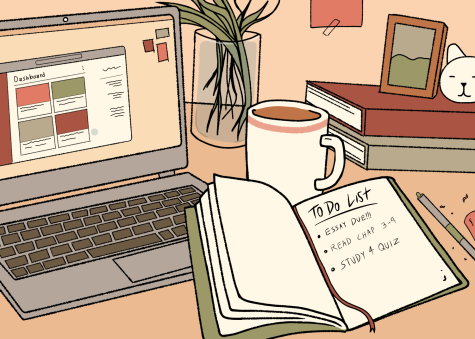Knowing your priorities
Tips on staying productive during the school year
September 29, 2022
It is the first Saturday of the school year, and there is finally an opportunity to catch your breath and enjoy a little alone time after a hectic first week of class. But alas! It seems that the article you are supposed to read for University Foundations is a bit longer than you expected, and word is your professor is not a soft grader. Plus, that new video game you have been eyeballing just dropped last week, and you have not called home yet to give your family an update on your first week of college.
That adds up quickly, and when you fall behind early you will suffer late.
I know the feeling better than anyone. Of my six quarters spent at Seattle Pacific University, I have probably spent four finals weeks grinding through work and sobbing in the breaks. Trust me when I say that is not a sustainable way to approach school. So, I dedicated my summer to changing my mindset and getting disciplined in a way that still allows for the social freedoms that define college. If you feel as lost as I was, or are just looking for small ways to improve your work-life balance, let me share with you a couple of my findings.
- Importance vs. Urgency
The first step to knowing what you should be taking care of at any moment is understanding what cannot wait and what should not wait. The former is much easier to identify than the latter, especially in a college environment where due dates are king, but to be successful in planning you must keep both in mind. Those jobs which ask you to take care of them immediately can be considered urgent, and those that you feel are most worthwhile to your development as a person can be considered important. Many of the things you do throughout the day will fall into both categories; a fair number will fall into neither.

So pull up your calendar, write down all the things you want to do tomorrow and the day after and try to label all of your activities. Be as specific as possible with it: What homework will you do during work hours? How will you spend your downtime? Do not be concerned if you find yourself placing importance on methods of relaxation, just as you should not worry about work being unimportant.
Ideally, what you are noticing is that your schedule is packed to the brim with important work and with minimal possible urgent work. If not, that is okay, especially as far as urgency is concerned. There is a limit to what you can do in school. But consider foremost those activities which you labeled urgent and unimportant, as that is where you are taking on maximum pressure for minimum reward. Might there be ways to work around some of the urgency of such an activity or reframe it to up its importance?
- Intentional Relaxation
The number one mistake I and many others have made in scheduling is not actively accounting for the moments when a break is necessary. It is easy to tell when work needs doing but much more difficult to discern when the brakes need pumping. By going out of your way to note when and how you want to take time off, you are winning twice over, first by holding yourself more accountable to your work and second by allowing yourself enjoyment in the ways you spend your free time.
I know I am not the only one who lets 15, 30, or 45 minutes at a time slip by on innocent TikTok or YouTube breaks. If you are asking me, it is not the practice that is hurting you, it is the fact it sneaks its way into your schedule under your nose. That being said, if you now have your calendar out and did indeed factor break time into your calculation of importance and urgency, go ahead and pen those in. Do your best to make that a habit; you do not need to predestine every minute of your day, but if you can look back on your day and know exactly how you spent it, I find it is easier to find satisfaction in your productivity.
There are plenty of other aspects of prioritization that I do not have the room to cover here, but if you are curious for more I highly recommend Stephen Covey’s “7 Habits of Highly Effective People.”
Hopefully, this was a helpful cursory glimpse into just how much room there is for growth in your scheduling. Procrastination is not a fixture of your identity. It is not as simple to fix as reading this article and calling it a day, but if you recognize the issue and treat it properly, it will become easier in short order.
























































































